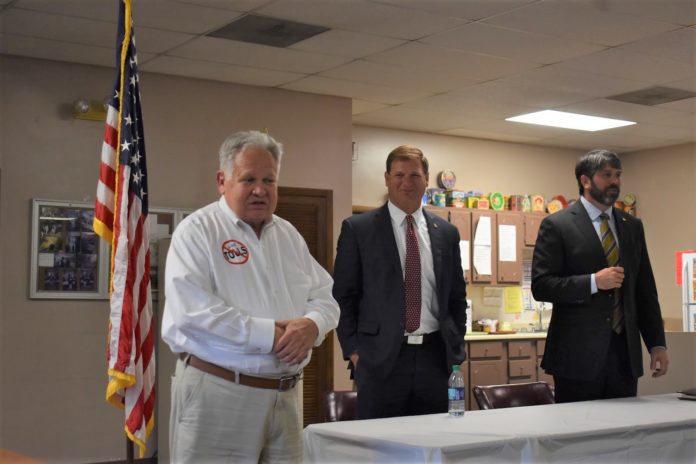
WEST POINT, Ala. – Cullman area legislators Sen. Garlan Gudger, R-Cullman and Rep. Scott Stadthagen, R-Hartselle came to West Point Thursday night for the third in a series of community forums sponsored by the Cullman Area Chamber of Commerce meant to bring elected officials face to face with their constituents.
The pair fielded a variety of questions and comments from the audience, including:
In light of concern about cell phone use by drivers, should they be allowed to have dogs in their laps?
The legislators expressed concern over any kind of driving distraction, and Stadthagen noted that legislation related to hand-held devices failed in the last session over the question of what could be included in a ban on driving distractions, including food, animals and other things. He indicated that the Legislature is concerned about the consequences of distracted driving, but has struggled to define what constitutes a distraction.
Should unleashed dogs, including service dogs, be allowed in grocery stores?
Gudger admitted to a lack of detailed knowledge about laws governing service animals, but stated that common sense dictates that service animals have to be used within certain boundaries.
What about dogs left outside?
Gudger explained that, as long as outside animals can have some type of roof over their heads and are being fed, the law says they are being cared for reasonably. He also said that he is an animal lover and pet owner, and he believes current laws do not do enough to protect pets.
Can the legislature find more money for the Cullman County Sheriff’s Office to patrol more areas of the county?
Stadthagen noted the Morgan County, his home, has a sheriff’s office that is stretched thin, too, and said he would be willing to sit down with Cullman County Sheriff Matt Gentry to talk about his office’s needs. Gudger said he and Gentry have already been in discussions.
When the asker followed up with a question about the possible use of revenues from the 10-cent fuel tax increase passed earlier this year, Gudger said the gas tax is for infrastructure projects only, and more funding for law enforcement would have to come from a new tax or cuts to other programs. He also explained West Point, which currently gets less than $8,000 per year in fuel taxes, will be getting more than $25,000 per year when the new tax goes into effect. In addition to distributions to municipalities, according to Gudger, the Cullman County will get and additional $1.2 million.
Will the “bridges to nowhere” on Alabama Highway 157 ever have roads?
Gudger reviewed efforts from his days with the Cullman City Council to secure grants that got the 157 completion project funded, and told the audience the project is to be completed by 2023.
One comment supported the use of some of the gas tax for improvements to the state port at Mobile.
Gudger agreed, saying a better port means increased exports of coal and poultry, and more shipping from Alabama means more people doing business with Alabama and more money for Alabama’s businesses.
Stadthagen took time to promote the 2020 Census, warning low participation could cost the state a congressional seat, and high enough participation could add one. Gudger added that information gathered during the census is secure and cannot be used by any other agency, and each participant means more money for state programs like mental health and education.
How about more funding for education?
Stadthagen briefly mentioned the possibility of a lottery and touted the Legislature’s passage of a 4% raise for public school teachers, but was clear that much more needs to be done. Gudger voiced his support for an appointed Alabama State Board of Education staffed by experienced educators. Both legislators spoke in favor of funding for workforce development and rural broadband technology.
Improving school safety
Talking about school safety, both legislators went to the topic of mental health, arguing for increased funding and more school-based counselors and therapists. Stadthagen noted that 40% of all jail and prison inmates suffer from some form of mental illness and expressed a desire to find ways to get such people out of jail and into care.
The legislators deflected questions and comments from one couple who argued against the use of drugs to treat childhood mental illness, deferring to WellStone Mental Health CEO Chris Van Dyke, who happened to be in attendance at the meeting. Van Dyke told the audience that, under certain circumstances, students have found success in school and life through the use of medications.
Should welfare and food stamp recipients have to take drug tests?
Both legislators supported the idea, and Stadthagen added that anyone receiving assistance who is able to work should also have to present proof that he or she is actively looking for work.
The meeting concluded with a few words from State Auditor Jim Zeigler, who stopped by to visit the legislators. He boasted that the most recent state audit is among the best the state has ever had, and that more than $1.1 billion in taxpayer-funded state property has been accounted for in the audit.
Copyright 2019 Humble Roots, LLC. All Rights Reserved.



















